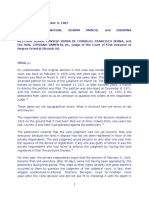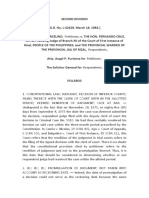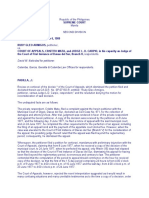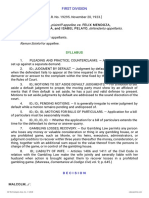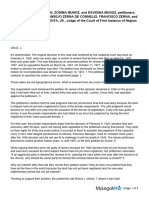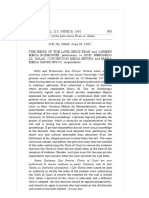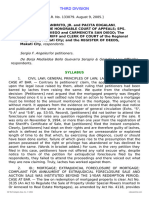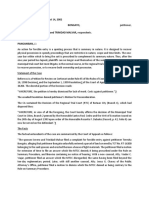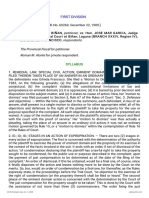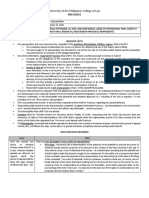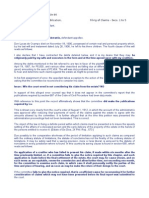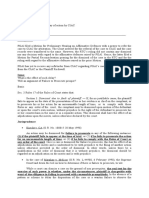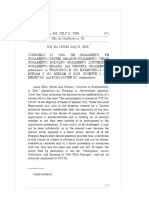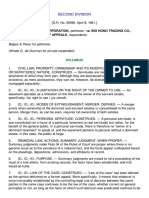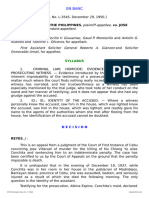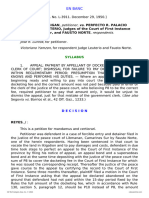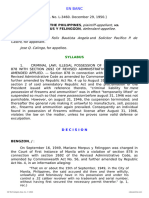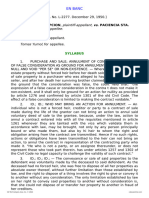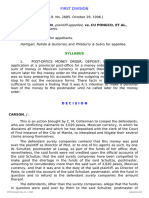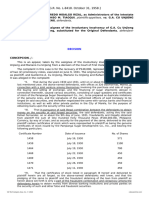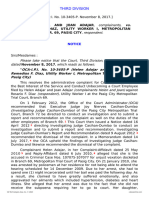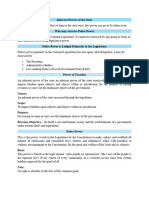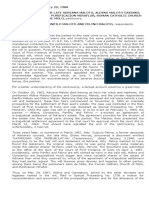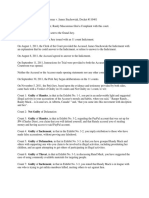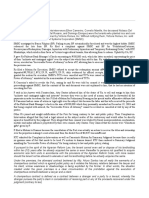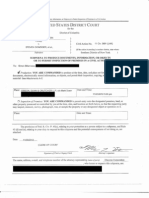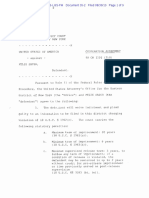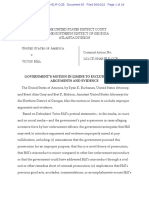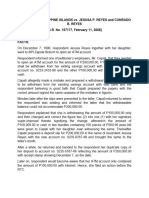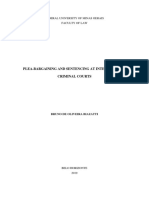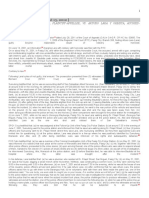0 ratings0% found this document useful (0 votes)
10 viewsPlaintiffs-Appellants Defendants-Appellees Bernabe de Guzman Mariano Alisangco E. G. Turner
Plaintiffs-Appellants Defendants-Appellees Bernabe de Guzman Mariano Alisangco E. G. Turner
Uploaded by
Riri AnredapThis document discusses the rules and timelines for appealing court decisions and presenting bills of exceptions in the Philippines. It finds that the rules are unclear in ordinary civil cases, but land registration cases allow 30 days to present a bill of exceptions. It overturns prior cases and seeks to establish clearer guidelines.
Copyright:
© All Rights Reserved
Available Formats
Download as PDF, TXT or read online from Scribd
Plaintiffs-Appellants Defendants-Appellees Bernabe de Guzman Mariano Alisangco E. G. Turner
Plaintiffs-Appellants Defendants-Appellees Bernabe de Guzman Mariano Alisangco E. G. Turner
Uploaded by
Riri Anredap0 ratings0% found this document useful (0 votes)
10 views7 pagesThis document discusses the rules and timelines for appealing court decisions and presenting bills of exceptions in the Philippines. It finds that the rules are unclear in ordinary civil cases, but land registration cases allow 30 days to present a bill of exceptions. It overturns prior cases and seeks to establish clearer guidelines.
Original Description:
N/A
Original Title
45514
Copyright
© © All Rights Reserved
Available Formats
PDF, TXT or read online from Scribd
Share this document
Did you find this document useful?
Is this content inappropriate?
This document discusses the rules and timelines for appealing court decisions and presenting bills of exceptions in the Philippines. It finds that the rules are unclear in ordinary civil cases, but land registration cases allow 30 days to present a bill of exceptions. It overturns prior cases and seeks to establish clearer guidelines.
Copyright:
© All Rights Reserved
Available Formats
Download as PDF, TXT or read online from Scribd
Download as pdf or txt
0 ratings0% found this document useful (0 votes)
10 views7 pagesPlaintiffs-Appellants Defendants-Appellees Bernabe de Guzman Mariano Alisangco E. G. Turner
Plaintiffs-Appellants Defendants-Appellees Bernabe de Guzman Mariano Alisangco E. G. Turner
Uploaded by
Riri AnredapThis document discusses the rules and timelines for appealing court decisions and presenting bills of exceptions in the Philippines. It finds that the rules are unclear in ordinary civil cases, but land registration cases allow 30 days to present a bill of exceptions. It overturns prior cases and seeks to establish clearer guidelines.
Copyright:
© All Rights Reserved
Available Formats
Download as PDF, TXT or read online from Scribd
Download as pdf or txt
You are on page 1of 7
EN BANC
[G.R. No. 12133. November 12, 1918.]
JUAN LAYDA, ET AL., plaintiffs-appellants, vs. HIGINO LEGAZPI,
ET AL., defendants-appellees.
Bernabe de Guzman and Mariano Alisangco for appellants.
E. G. Turner for appellees.
SYLLABUS
1. COURTS, APPELLATE; JURISDICTION OF, RIGHT TO EXAMINE
RECORD FOR PURPOSE OF DETERMINING. — Appellate courts have the right
to examine the record for the purpose of determining whether they have
jurisdiction or not, even though that question has not been raised by any of
the parties. Jurisdiction of appellate courts is not conferred by consent of the
parties. The right to appeal is statutory.
2. ID.; JUDGMENTS, WHEN FINAL. — Judgments in ordinary civil
actions become final and may be executed the moment the time for
perfecting an appeal has elapsed. If the appellant allows that time to elapse,
his right to appeal is lost. A failure to perfect the appeal, within the time
prescribed, is jurisdictional and the certification of a bill of exceptions
thereafter cannot restore the jurisdiction which is lost.
3. BILL OF EXCEPTIONS; TIME OF PRESENTATION IN LAND
REGISTRATION CASES. — In land registration cases, the bill of exceptions
must be presented within thirty days from the date of the receipt of the
decision of the court; that period may be extended by an order of the court
before its expiration; whatever time is occupied by the court in considering a
motion for a new trial, from the time of its presentation up to the time of
notice of the decision thereon, shall not be counted as a part of the said
thirty days. (Roman Catholic Bishop of Tuguegarao vs. Director oœ Lands,
34 Phil. Rep., 623; Estate of Cordoba and Zarate vs. Alabado, 34 Phil. Rep.,
920; Bermudez vs. Director of Lands, 36 Phil. Rep., 774.)
4. ID.; TIME OF PRESENTATION IN ORDINARY ACTIONS. — In an
ordinary action the aggrieved party has (a) thirty days within which to
present a motion for a new trial; (b) after notice of the ruling upon his
motion, he has five days within which to present "notice of his intention to
present a bill of exceptions;" (c) after the presentation of "notice of his
intention to present a bill of exceptions" he has ten days within which to
present his bill of exceptions (Lim vs. Singian and Soler, 37 Phil. Rep., 817);
(d) failure to comply with any of the foregoing requirements, within the
various periods mentioned, will cause the judgment to become final, upon
which a writ of execution may issue, and the presentation of a bill of
exceptions will not give the appellate court jurisdiction; (e) each and all of
CD Technologies Asia, Inc. © 2023 cdasiaonline.com
said periods may be extended by order of the court upon application made
prior to the expiration of the original period.
5. JUDGMENT, FINALITY OF; NECESSITY OF DEFINITE DATE FOR. —
Public policy and sound practice demand that, at the risk of occasional
errors, judgments of courts should become final at some definite date fixed
by the law. The very object for which courts were constituted was to put an
end to controversies. (Dy Cay vs. Crossfield & O'Brien, 38 Phil. Rep., 521.)
6. SANTILLAN vs. ALMONTE (24 PHIL. REP., 227) AND GASCON
ENRIQUEZ vs. GIBBS (27 PHIL. REP., 110) OVERRULED. — For the special
reasons given in the decision, the doctrine heretofore announced in the
cases of Santillan vs. Almonte, and Gascon Enriquez vs. Gibbs has been
expressly overruled.
DECISION
JOHNSON, J : p
This action was commenced in the Court of First Instance of the
Province of Pangasinan, on the 21st day of January, 1915, and, after
numerous delays, was finally submitted to the Supreme Court for final
decision on the 9th day of July, 1918. The purpose of the action was to
recover, as owners, a piece or parcel of land 47 meters long and 46 meters
wide, together with P15 as damages.
Upon an examination of the record, it was discovered that the decision
of the lower court had become final before the appeal had been perfected.
That being true, this court acquired no jurisdiction by virtue of the appeal;
and not having jurisdiction to consider the case upon its merits, it must be
dismissed.
Appellate courts have a right to examine the record for the purpose of
determining whether they have jurisdiction or not, even though that
question has not been raised. Jurisdiction of appellate courts is not conferred
by consent of the parties. The right to appeal is statutory.
Judgments in ordinary civil actions become final and may be executed
the moment the time for perfecting an appeal has elapsed. If the appellant
allows that time to elapse, his right to an appeal is lost. A failure to perfect
the appeal within the time prescribed is jurisdictional and the certification of
a bill of exceptions thereafter cannot restore the jurisdiction which is lost.
Since the decision in the case of Gomez Garcia vs. Hipolito (2 Phil.
Rep., 732), hundreds of motions have been made for the purpose of
dismissing bills of exceptions. The court has been annoyed by such motions,
due to the fact that the time for the presentation of bills of exceptions has
not been definitely fixed.
Since the pronouncement of numerous decisions upon the question
when bills of exceptions should be presented, the Legislature adopted Act
CD Technologies Asia, Inc. © 2023 cdasiaonline.com
No. 2347 (Sections 26 and 27), which has made more certain that period. By
virtue of Section 26 of said Act, the losing party in a land registration case
must present his bill of exceptions within thirty days, counting from the date
on which he received a copy of the decision, unless that period is extended
by order of the court before its expiration. (Roman Catholic Bishop of
Tuguegarao vs. Director of Lands, 34 Phil. Rep., 623; Bermudez vs. Director
of Lands, 36 Phil. Rep., 774; Estate of Cordoba and Zarate vs. Alabado, 34
Phil. Rep., 920.)
From said thirty days there may be deducted the time which the court
occupied in considering a motion for a new trial and until notice of the
decision on said motion is received.
Since the announcement of the rule in the two above-cited cases,
scarcely a motion has been presented for the dismissal of a bill of exceptions
in a land registration case. The question whether or not the bill of exceptions
is presented within time in a land registration case, now, is simply a matter
of counting the days. Uncertainty leads to confusion, annoyance and delay.
A more difficult question is presented when we consider the exact
period within which a bill of exceptions must be presented in ordinary
actions. That period is not definitely fixed, in the terms of days, by any
statute. In fact, that period is about as uncertain and indefinite as it could
possibly be made. Section 143 of Act No. 190 provides that the bill of
exceptions must be presented within ten days after "notice of an intention to
present a bill of exceptions is given." (Lim vs. Singian and Soler, 37 Phil.
Rep., 817.) But when or within what period must the "notice of an intention
to present a bill of exceptions" be given? Said section provides that such
notice may be given (a) at the time of rendition of the judgment; or (b) as
soon thereafter as may be practicable; and (c) at least before the end of the
term of the court at which final judgment is rendered. Thus it is seen that
under that section it is impossible to have any uniform rule for the
presentation of the bill of exceptions, for the reason that the tim e when
"notice of an intention to present a bill of exceptions" must be given, is
uncertain. Certainly, the aggrieved party could not be expected to "give
notice of his intention to present a bill of exceptions at the time of the
rendition of the judgment," if he had no notice at that time of the decision;
and the time "as soon thereafter as may be practicable" is as indefinite and
uncertain as the number of cases which will arise; and "the end of the term
of the court" is equally as uncertain. It is a fact that the terms of courts are
closed when the business of the particular province' is finished; that is
especially so when the judge is sitting in two provinces. The law fixes the
time when the terms of court begin but does not fix the time when the terms
close, while in the city of Manila there are no terms; the law requires that the
judges shall hold court on all working days during the year while there are
cases ready for trial. (Sec. 5, Act No. 2347.) The law fixes the exact time (ten
days), (Sec. 143) within which the bill of exceptions must be presented after
"notice of an intention to present a bill of exceptions" is given. (Lim vs.
Singian and Soler, supra.) The period above indicated, within which "notice
of an intention to present a bill of exceptions" must be presented, is
CD Technologies Asia, Inc. © 2023 cdasiaonline.com
rendered more uncertain by the fact that, after notice of the decision, a
motion for a new trial may be presented. And it has been held, in decisions
without number, that the time, from the presentation of said motion, until
notice of the decision thereon is given, must not be counted as a part of the
time within which "notice of an intention to present a bill of exceptions" must
be given.
In the case of Lim vs. Singian and Soler (supra), we held that the
appellant must file his bill of exceptions within ten days from the "time of
giving notice of his intention to do so" (Article 143, Act No. 190), or within
such additional time as the trial court may, by express order, have allowed,
upon petition for enlargement filed before the expiration of said statutory
period of ten days; and that unless the appellant files his bill of exceptions
within such time, the judgment becomes final and the successful litigant is
entitled to a writ of execution. That case settled the question definitely and
finally with reference to the time within which a bill of exceptions must be
presented in an ordinary action after the losing party "gives notice of his
intention to appeal." That decision left open the question: Within what period
must "notice of an intention to present a bill of exceptions" be given?
Section 27 of Act No. 2347 provides, in ordinary actions, that a new
trial may be granted within thirty days after rendition of judgment and notice
thereof. A decision cannot become final, therefore, until after the expiration
of thirty days; unless a motion for a rehearing is presented earlier; that is to
say, if a motion for a new trial is presented upon the very day upon which
notice of the decision is given, or any day thereafter within the thirty days,
and the judge should decide the same immediately, the aggrieved party
cannot claim the balance of the thirty days against the period fixed for the
presentation of his bill of exceptions. In other words, if the aggrieved party
should present his motion for a rehearing on the very day on which he
received notice of the decision, and the judge should, on the same day,
decide the motion and give notice thereof, the time for the presentation of
his bill of exceptions would begin to run immediately upon receipt of said
notice, and that must be the rule whether the motion was presented upon
the first of the thirty days or upon the last. While the motion for a rehearing
must be presented within thirty days, the time for "giving notice of an
intention to present a bill of exceptions" will not begin to run until after said
motion is decided and notice thereof is given.
Public policy and sound practice demand that, at the risk of occasional
errors, judgments of courts should become final at some definite date fixed
by the law. The very object for which courts were instituted was to put an
end to controversies. (Dy Cay vs. Crossfield & O'Brien, 38 Phil. Rep., 251.)
In view of that doctrine, we believe that we are giving a sane
interpretation of the general provisions of the law when we decide that the
"notice of an intention to present a bill of exceptions" must be given within a
period of five days from the receipt of the notice of the decision, if no motion
for a new trial is made, and, within a period of five days after notice of the
decision on a motion for a new trial.
From all of the foregoing, and taking into consideration the
CD Technologies Asia, Inc. © 2023 cdasiaonline.com
amendments to Act No. 190 upon the question which we are discussing, we
are confident that we are within the spirit, if not the letter, of the law in
announcing the following periods within which bills of exceptions must be
presented:
(1) That in land registration cases, the bill of exception must be
presented within thirty days from the date of the receipt of the decision of
the court; that period may be extended by an order of the court before its
expiration; that whatever time is occupied by the court in considering a
motion for a new trial, from the time of its presentation up to the time of
notice of the decision thereon, shall not be counted; (Roman Catholic Bishop
of Tuguegarao vs. Director of Lands, 34 Phil. Rep., 623; Bermudez vs.
Director of Lands, 36 Phil. Rep., 774; Estate of Cordoba and Zarate vs.
Alabado, 31 Phil. Rep., 920.)
(2) That in ordinary actions, the aggrieved party has (a) thirty days
within which to present a motion for a new trial; (b) that after notice of the
ruling upon his motion, he has five days within which to present "notice of
his intention to present a bill of exceptions;" (c) that after the presentation of
"notice of his intention to present a bill of exceptions" he has ten days within
which to present his bill of exceptions (Lim vs. Singian and Soler, supra); (d)
that failure to comply with any of the foregoing requirements, within the
various periods mentioned, will cause the judgment to become final, upon
which a writ of execution may issue, and the presentation of a bill of
exceptions thereafter will not give the appellate court jurisdiction; and (e)
that each and all of said periods may be extended, by order of the court
upon application made prior to the expiration of the original period.
In the present case, the following facts appear: (a) The decision was
rendered on the 20th day of September, 1915 (the record does not show
when the aggrieved party received notice of said decision); (b) on the 11th
day of October, 1915, the aggrieved party presented a motion for a new
trial; (c) the motion for a new trial was denied on the 15th day of October,
1915 (the record does not show when the aggrieved party received notice of
the denial of said motion); (d ) an exception to the order denying the motion
for a new trial was presented on the 25th day of October, 1915; (e) the
aggrieved party gave "notice of his intention to present a bill of exceptions"
on the 22nd day of October, 1915; (f) nothing further was done until the
20th day of November, 1915, when the aggrieved party presented a motion
for an extension of time within which to present his bill of exceptions, which
motion was granted; (g) the bill of exceptions was presented on the 2nd day
of December, 1915, and certified by the judge on the 11th day of December,
1915, and the same was received in the Supreme Court on the 6th day of
April, 1916.
It will be seen from the above facts that at least 29 days expired from
the date of the "notice of an intention to present a bill of exceptions" before
the motion was made for an extension of time within which to present the
bill of exceptions. Said motion was therefore made after the expiration of the
period for the presentation of the bill of exceptions and could not be
extended. (Bermudez vs. Director of Lands, 36 Phil. Rep., 774; Credit
CD Technologies Asia, Inc. © 2023 cdasiaonline.com
Company vs. Arkansas, etc., Company, 128 U.S., 258.)
In addition to the foregoing reasons for dismissing the bill of
exceptions, the record contains the following additional reasons for declaring
the appeal abandoned; (1) The bill of exceptions was not forwarded to the
clerk of the Supreme Court within the time prescribed by law and the Rules
of the Court; (Section 143 of Act No. 190; Rule 14 of the Supreme Court;
Government of the Philippine Islands vs. Abrion, 38 Phil. Rep., 679; De Leon
vs. Rodriguez and Cruz, R. G. No. 14569. 1 ); (2) for the reason that neither
the registration fees nor the amount necessary for the printing of the bill of
exceptions were deposited within the time prescribed by the rules (rule 15 of
the Supreme Court; Duay and Luanzon vs. Puyaoan, R. G. No. 14457 2 ;
Reyes and Caluag vs. Reyes, R. G. No. 14472 3 ; De Leon vs. Celestra, R. G.
No. 14456 4 ; Ortega vs. Ferrer, R. G. No. 14443 5 ; Rodriguez vs. Garcia, R.
G. No. 14337 6 ; Enriquez vs. Mercado and Liwanag, R. G. No. 14403 7 ); (3)
for the reason that the brief of the appellant was not presented within the
time prescribed. (Rule 21 of the Supreme Court; Cadapan vs. Balquiebra, R.
G. No. 13686 8 ; Zelser vs. Bernardo, R. G. No. 13535 9 ; Javier and Acuna vs.
Ponce, R. G. No. 13879 10 ; Municipality of Paoay vs. Diaz, R. G. No. 14222 11
.)
In holding, as we do, that "notice of intention to present a bill of
exceptions" in an ordinary action must be given within five days from the
date of notice of the decision, or of the order denying the motion for a new
trial, we are aware that we are expressly overruling the cases of Santillan vs.
Almonte (24 Phil. Rep., 277) and Gascon Enriquez vs. Gibbs (27 Phil. Rep.,
110) in which it was held that twenty days would be allowed for that
purpose. Since these cases were decided the Legislature has passed Act No.
2347, by which Section 145 of the Code of Civil Procedure was so amended
as to allow a dissatisfied litigant thirty days from the date of the notice of the
decision in which to move for a new trial. Having this considerable period of
time in which to reflect upon the advisability of taking an appeal, the
reasons, which we gave in the cases cited for allowing twenty days in which
to give of intention to take a bill of exceptions, no longer exist.
For the reason that the bill of exceptions was not presented in time,
the judgment of the lower court became final and the right to appeal was
lost. This court, therefore, has no jurisdiction to consider the appeal. For that
reason, the same is dismissed without any finding as to costs. So ordered.
Arellano, C.J., Torres, Street, Avanceña, Malcolm and Fisher, JJ., concur.
Footnotes
1. Resolution of October 21, 1918.
2. Resolution of October 21, 1918.
3. Resolution of September 23, 1918.
4. Resolution of September 16, 1918.
5. Resolution of September 16, 1918.
CD Technologies Asia, Inc. © 2023 cdasiaonline.com
6. Resolution of September 16, 1918.
7. Resolution of September 2, 1918.
8. Resolution of July 8, 1918.
9 Resolution of July 15, 1918.
10. Resolution of July 15, 1918.
11. Resolution of October 7, 1918.
CD Technologies Asia, Inc. © 2023 cdasiaonline.com
You might also like
- D.O.motion4contempt FINALDocument8 pagesD.O.motion4contempt FINALAaron Parnas100% (1)
- Federal Jurisdiction FlowchartDocument1 pageFederal Jurisdiction FlowchartLeidy Johanna100% (1)
- Case Digest Last 3 CasesDocument2 pagesCase Digest Last 3 CasesBannylyn Mae Silaroy GamitNo ratings yet
- People Vs Abuyen DigestDocument2 pagesPeople Vs Abuyen DigestRussell John Hipolito100% (1)
- Canon 12Document34 pagesCanon 12JL VertulfoNo ratings yet
- Alonzo vs. PaduaDocument5 pagesAlonzo vs. PaduaKathNo ratings yet
- G.R. No. L-35469Document3 pagesG.R. No. L-35469Danica CristobalNo ratings yet
- 6 Banogon vs. Zerna 154 Scra 593Document3 pages6 Banogon vs. Zerna 154 Scra 593France SanchezNo ratings yet
- Years Before It Occurred To Them To Question The Judgment ofDocument16 pagesYears Before It Occurred To Them To Question The Judgment ofCedrick Contado Susi BocoNo ratings yet
- Legal Ethics-CasesDocument131 pagesLegal Ethics-CasesAlberto NicholsNo ratings yet
- Marcelino V CruzDocument11 pagesMarcelino V CruzClarisa NatividadNo ratings yet
- Zerna CaseDocument3 pagesZerna Casetere muriNo ratings yet
- Plaintiff-Appellee Vs Vs Defendants-Appellants Jose D. Cid Vicente LlanesDocument2 pagesPlaintiff-Appellee Vs Vs Defendants-Appellants Jose D. Cid Vicente LlanesKristinaCastellanoNo ratings yet
- Supreme Court: David W. Natividad For Petitioner. Calamba, Garcia, Geralde & Calamba Law Offices For RespondentsDocument5 pagesSupreme Court: David W. Natividad For Petitioner. Calamba, Garcia, Geralde & Calamba Law Offices For RespondentsJm BrjNo ratings yet
- Sps. Perez v. HermanoDocument4 pagesSps. Perez v. HermanoJenny Mary Dagun100% (2)
- Marcelino v. Cruz, G.R. No. L-42428, March 18, 1983.full TextDocument6 pagesMarcelino v. Cruz, G.R. No. L-42428, March 18, 1983.full TextRyuzaki HidekiNo ratings yet
- Petitioner Respondents Ceferino V. Argueza Magtanggol C. GunigundoDocument6 pagesPetitioner Respondents Ceferino V. Argueza Magtanggol C. Gunigundomarie janNo ratings yet
- Plaintiff-Appellee Vs Vs Defendants-Appellants Hipolito de Jesus Ramon SoteloDocument4 pagesPlaintiff-Appellee Vs Vs Defendants-Appellants Hipolito de Jesus Ramon SoteloKirby MalibiranNo ratings yet
- Encarnacion Banogon Etal Vs Melchor Zerna EtalDocument3 pagesEncarnacion Banogon Etal Vs Melchor Zerna EtalJerlyn AlejoNo ratings yet
- G.R. No. 71998-99Document4 pagesG.R. No. 71998-99SIR G.No ratings yet
- Curez Aan MaanrclloDocument5 pagesCurez Aan MaanrclloJuan Rafael SilvaNo ratings yet
- Petitioner vs. Respondents: Third DivisionDocument494 pagesPetitioner vs. Respondents: Third DivisionAira Rowena TalactacNo ratings yet
- Sajonas vs. CADocument4 pagesSajonas vs. CAVilpa Villabas100% (1)
- Civ Rev 1 - Armigos Vs CADocument2 pagesCiv Rev 1 - Armigos Vs CAOM MolinsNo ratings yet
- Jurisdiction CasesDocument25 pagesJurisdiction CasesAerwin AbesamisNo ratings yet
- Banogan V ZernaDocument2 pagesBanogan V ZernanazhNo ratings yet
- In The Matter of The Estate of Telesforo de Dios, GR L-7940. Mar. 27, 1913Document2 pagesIn The Matter of The Estate of Telesforo de Dios, GR L-7940. Mar. 27, 1913Christopher ArellanoNo ratings yet
- 14 Armigos vs. Court of AppealsDocument3 pages14 Armigos vs. Court of AppealsSimeon TutaanNo ratings yet
- Heirs of The Late Jesus Fran vs. SalasDocument24 pagesHeirs of The Late Jesus Fran vs. SalasShairaCamilleGarciaNo ratings yet
- Credit Transactions Sps. Landrito Vs CA, G.R. No. 133079, August 9, 2005Document9 pagesCredit Transactions Sps. Landrito Vs CA, G.R. No. 133079, August 9, 2005Brenda de la GenteNo ratings yet
- Yap v. TañadaDocument10 pagesYap v. Tañadabrandon dawisNo ratings yet
- Banco Popular de Puerto Rico v. David Greenblatt, The Official Secured Creditors' Committee of Amfesco Industries, Inc., Etc., Intervenor, 964 F.2d 1227, 1st Cir. (1992)Document10 pagesBanco Popular de Puerto Rico v. David Greenblatt, The Official Secured Creditors' Committee of Amfesco Industries, Inc., Etc., Intervenor, 964 F.2d 1227, 1st Cir. (1992)Scribd Government DocsNo ratings yet
- Republic Vs ReyesDocument8 pagesRepublic Vs ReyesJR C Galido IIINo ratings yet
- Dirige v. BiranyaDocument6 pagesDirige v. Biranyagomeziii_johnNo ratings yet
- Heirs of Fran v. Salas, G.R. No. L-53546, June 25, 1992 (210 SCRA 303)Document16 pagesHeirs of Fran v. Salas, G.R. No. L-53546, June 25, 1992 (210 SCRA 303)ryanmeinNo ratings yet
- G.R. No. 36799Document2 pagesG.R. No. 36799mehNo ratings yet
- Bongato Vs MalvarDocument7 pagesBongato Vs MalvarShane Marie CanonoNo ratings yet
- Gregorio Araneta, Inc. vs. Phil. Sugar Estates Development, 20 SCRA 330 (FCD)Document3 pagesGregorio Araneta, Inc. vs. Phil. Sugar Estates Development, 20 SCRA 330 (FCD)Leslie Joy MingoNo ratings yet
- Mun of Binan V GarciaDocument11 pagesMun of Binan V GarciaVhinj CostillasNo ratings yet
- Lilia T. Ong v. CA October 1991Document6 pagesLilia T. Ong v. CA October 1991MyrahNo ratings yet
- Paranaque Kings Enterprises v. SantosDocument17 pagesParanaque Kings Enterprises v. SantosMaryland AlajasNo ratings yet
- Yek Seng Co vs. CADocument7 pagesYek Seng Co vs. CAKelvin Jhones AligaNo ratings yet
- Municipality of Binan v. GarciaDocument3 pagesMunicipality of Binan v. GarciaMaria Analyn100% (1)
- Co vs. New Prosperity Plastic ProductsDocument6 pagesCo vs. New Prosperity Plastic ProductsRocky MagcamitNo ratings yet
- PositionPaper Cancellation of Adverse AbcdDocument8 pagesPositionPaper Cancellation of Adverse AbcdMaximo Isidro100% (1)
- Dumaguete V PPA DigestDocument13 pagesDumaguete V PPA DigestIvan Montealegre ConchasNo ratings yet
- Dimayuga v. Philippine CommercialDocument4 pagesDimayuga v. Philippine CommercialMico Maagma CarpioNo ratings yet
- Villasis LMTDocument46 pagesVillasis LMTANo ratings yet
- Feb 17 Spec Pro OabcDocument6 pagesFeb 17 Spec Pro OabcMsIc GabrielNo ratings yet
- Panagiotis Kotsopoulos v. Asturia Shipping Co., S.A., Hadjilias & Co., LTD., and The S/T Mercury, Her Engines, Etc., 467 F.2d 91, 2d Cir. (1972)Document6 pagesPanagiotis Kotsopoulos v. Asturia Shipping Co., S.A., Hadjilias & Co., LTD., and The S/T Mercury, Her Engines, Etc., 467 F.2d 91, 2d Cir. (1972)Scribd Government DocsNo ratings yet
- 500.10.04 Legal MemoDocument3 pages500.10.04 Legal MemoArvin CruzNo ratings yet
- Adez Realty v. CADocument5 pagesAdez Realty v. CAPrncssbblgmNo ratings yet
- Continental CementDocument3 pagesContinental CementFatima MagsinoNo ratings yet
- I Crim SB-18-CRM-0293 People Vs Camsol, Et Al 09-17-2018Document9 pagesI Crim SB-18-CRM-0293 People Vs Camsol, Et Al 09-17-2018Cara Bello PedrealbaNo ratings yet
- David W. Natividad For Petitioner. Calamba, Garcia, Geralde & Calamba Law Offices For RespondentsDocument2 pagesDavid W. Natividad For Petitioner. Calamba, Garcia, Geralde & Calamba Law Offices For RespondentsMary Divina FranciscoNo ratings yet
- Persons and FamilyDocument2 pagesPersons and FamilyMary RoseNo ratings yet
- 29 Vda. de Gualberto vs. GoDocument13 pages29 Vda. de Gualberto vs. GoJanine RegaladoNo ratings yet
- Rachel C. Celestial V. Jesse Cachopero: FactsDocument4 pagesRachel C. Celestial V. Jesse Cachopero: FactsjuhrizNo ratings yet
- Module 6Document16 pagesModule 6Hermay BanarioNo ratings yet
- Module 6Document16 pagesModule 6Hermay BanarioNo ratings yet
- Solid Manila Corp. v. Bio Hong Trading Co., Inc.Document10 pagesSolid Manila Corp. v. Bio Hong Trading Co., Inc.Macy YbanezNo ratings yet
- Parties in Civil Litigation 2Document32 pagesParties in Civil Litigation 2Andziso CairoNo ratings yet
- Petition for Certiorari Denied Without Opinion: Patent Case 98-1972.From EverandPetition for Certiorari Denied Without Opinion: Patent Case 98-1972.No ratings yet
- The People of The Philippines, - Jose Villaruel,: en BancDocument3 pagesThe People of The Philippines, - Jose Villaruel,: en BancRiri AnredapNo ratings yet
- Petitioner Respondents Jose R. Luntok, Victoriano YamzonDocument3 pagesPetitioner Respondents Jose R. Luntok, Victoriano YamzonRiri AnredapNo ratings yet
- Plaintiff-Appellant Defendant-Appellee Solicitor General Felix Bautista Angelo Solicitor Pacifico P. de Castro, Jose Q. CalingoDocument2 pagesPlaintiff-Appellant Defendant-Appellee Solicitor General Felix Bautista Angelo Solicitor Pacifico P. de Castro, Jose Q. CalingoRiri AnredapNo ratings yet
- Plaintiff-Appellee Defendant-Appellant Teofilo Mendoza, Quijano, Alidio & AzoresDocument3 pagesPlaintiff-Appellee Defendant-Appellant Teofilo Mendoza, Quijano, Alidio & AzoresRiri AnredapNo ratings yet
- Plaintiff-Appellant Defendant-Appellee Yap & Garcia, Tomas YumolDocument5 pagesPlaintiff-Appellant Defendant-Appellee Yap & Garcia, Tomas YumolRiri AnredapNo ratings yet
- Plaintiff-Appellee Defendants-Appellants Bishop & O'Brien, Hartigan, Rohde & Gutierrez, Pillsburry & SutroDocument4 pagesPlaintiff-Appellee Defendants-Appellants Bishop & O'Brien, Hartigan, Rohde & Gutierrez, Pillsburry & SutroRiri AnredapNo ratings yet
- (G.R. No. L-8418. October 31, 1958.) : DecisionDocument4 pages(G.R. No. L-8418. October 31, 1958.) : DecisionRiri AnredapNo ratings yet
- Complainants RespondentDocument7 pagesComplainants RespondentRiri AnredapNo ratings yet
- Petitioners Respondent: Spouses Manuel and Rosemarie Wee, - Rosario D. GalvezDocument12 pagesPetitioners Respondent: Spouses Manuel and Rosemarie Wee, - Rosario D. GalvezRiri AnredapNo ratings yet
- Consti ReviewerDocument4 pagesConsti ReviewerRiri AnredapNo ratings yet
- Gender and Development VV FinalDocument4 pagesGender and Development VV FinalRiri AnredapNo ratings yet
- Red DigestDocument6 pagesRed DigestRiri AnredapNo ratings yet
- Tolentino v. Secretary of FinanceDocument133 pagesTolentino v. Secretary of FinanceRiri AnredapNo ratings yet
- Character EvidenceDocument39 pagesCharacter EvidenceMarvin GoshanNo ratings yet
- Kozak Change of VenueDocument199 pagesKozak Change of Venuedmronline100% (1)
- PTC Vs LegaspiDocument2 pagesPTC Vs Legaspitregine444No ratings yet
- Republic of The Philippines, Petitioner, vs. Sandiganbayan, Major General Josephus Q. Ramas and Elizabeth Dimaano, RespondentsDocument20 pagesRepublic of The Philippines, Petitioner, vs. Sandiganbayan, Major General Josephus Q. Ramas and Elizabeth Dimaano, RespondentsRobby DelgadoNo ratings yet
- Summary ProcedureDocument10 pagesSummary ProcedureRaymund Christian Ong AbrantesNo ratings yet
- Postition PaperDocument3 pagesPostition PapermarialourdespgarciaNo ratings yet
- People Vs MorenoDocument14 pagesPeople Vs MorenoFacio BoniNo ratings yet
- Study - Guide 2Document11 pagesStudy - Guide 2steven stone (STU)No ratings yet
- Pvt. Chelsea Manning Formal Application For Presidential PardonDocument10 pagesPvt. Chelsea Manning Formal Application For Presidential PardonLeakSourceInfoNo ratings yet
- Succession From Article 828 1105Document600 pagesSuccession From Article 828 1105pit1xNo ratings yet
- Verdict 110401Document2 pagesVerdict 110401Darryl BrownNo ratings yet
- M4.7 Bailon-Casilao v. Court of AppealsDocument8 pagesM4.7 Bailon-Casilao v. Court of AppealsAnnieNo ratings yet
- Nocom V CamerinoDocument2 pagesNocom V Camerinolovekimsohyun89No ratings yet
- Billenness SubpoenaDocument39 pagesBillenness SubpoenapbgristNo ratings yet
- PCGG Vs SandiganbayanDocument3 pagesPCGG Vs SandiganbayanAldrinn BenamirNo ratings yet
- Boston Equity Resources, Inc. v. CADocument4 pagesBoston Equity Resources, Inc. v. CAKarla BeeNo ratings yet
- D&A: Cooperation Agreement Between Andrew Weissmann & Felix SaterDocument9 pagesD&A: Cooperation Agreement Between Andrew Weissmann & Felix SaterD&A Investigations, Inc.No ratings yet
- Government Motion To Exclude Evidence/arguments in Victor Hill TrialDocument18 pagesGovernment Motion To Exclude Evidence/arguments in Victor Hill TrialJonathan RaymondNo ratings yet
- Case StudyDocument6 pagesCase StudyIanne Gayle LugasanNo ratings yet
- 15 Antillon v. BarcelonDocument2 pages15 Antillon v. BarcelonShannon Gail MaongsongNo ratings yet
- Bruno Biazatti Master ThesisDocument233 pagesBruno Biazatti Master ThesisHumberto AguiarNo ratings yet
- Orbista Case-Custodial InvestigationDocument7 pagesOrbista Case-Custodial InvestigationJai DouglasNo ratings yet
- People of The Phil V Jeffrey Victoria y CristobalDocument10 pagesPeople of The Phil V Jeffrey Victoria y CristobalChristianneDominiqueGravosoNo ratings yet
- CJS Answer KeyDocument48 pagesCJS Answer KeyIrish MelchorNo ratings yet
- John David Boggs v. William Merideth: ComplaintDocument11 pagesJohn David Boggs v. William Merideth: ComplaintFindLawNo ratings yet
- The CaseDocument3 pagesThe CaseRav BahriNo ratings yet









